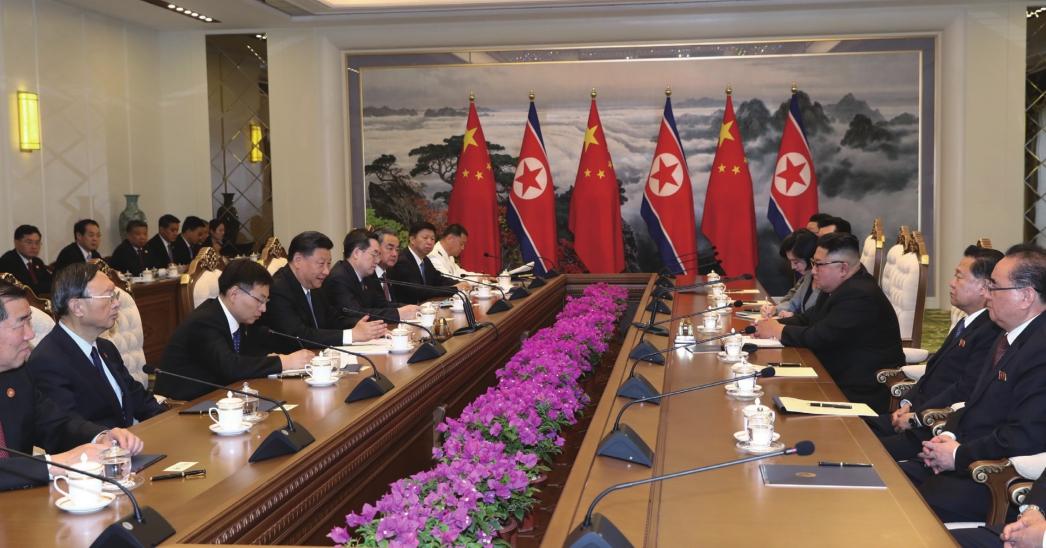SEALED BY HISTORY
2019-07-09ByShiYongming
By Shi Yongming
Chinese President Xi Jinpings recent two-day (June 20-21) state visit to the Democratic Peoples Republic of Korea (DPRK), coinciding with the 70th anniversary of the diplomatic ties between the two countries, was a major diplomatic action that consolidated the bilateral friendship and promoted a political settle- ment of the Korean Peninsula nuclear issue.
The visit was widely followed as it took place ahead of the Group of 20 (G20) Summit in Japan and against a backdrop of deepening trade friction between China and the U.S.
The state visit to the DPRK was the fi fth time the two leaders have met in the last 15 months, demonstrating the two countries readiness to work together for permanent peace on the Korean Peninsula.
At a critical period of the political dialogue on the peninsula, it is natural that promoting a political settlement has been an important part of the talks between the two leaders. Xi said his visit was aimed at consolidating and carrying forward the China-DPRK friendship and advancing a political settlement of the Korean Peninsula nuclear issue.
However, since the visit took place just days before the G20 Osaka Summit, some Western media alleged that China might use the DPRK as a card to ease the trade friction with the U.S.
For a long time, the diplomatic lexicon of the U.S. and some other Western countries has consisted of only two terms: selfinterest and strategic gaming. Anything can be a bargaining chip for them. After the Cold War, despite the increasingly close economic ties between China and the U.S., the two nations find it hard to meet each other halfway politically. The U.S. regards Chinas policy toward the DPRK as part of its policy toward the U.S. In its thinking, China could play the “DPRK card” when it is needed.
But that is a misreading of Chinas diplomacy and the nature of China-DPRK relations. China has always conducted diplomacy in light of the public good. On the Korean Peninsula issue, China has always upheld the spirit of creating a community with a shared future for humanity and pursued the common security and development of all parties involved.
Under such a diplomatic framework, China would never use other countries as a bargaining chip. It conducts dialogue and consultations based only on a win-win spirit. Therefore, the development of ChinaDPRK relations has nothing to do with the state of China-U.S. relations.
It can be clearly foreseen that the more stable China-DPRK relations are in the future, the more conducive it will be to establishing common security and lasting peace on the Korean Peninsula.
Ties with long roots
Historically, China and the Korean Peninsula have had close cultural and traditional ties since ancient times, with the two sides forming a kind of interdependency. In modern times, some Western scholars, seeking to rationalize the aggression of Western imperialism and drive a wedge between China and its neighboring countries, twisted the tributary system, where China was the central force. But the fact is that China and its neighbors developed a system featuring voluntary mutual political recognition, with security interdependence at its center. For instance, though the government of the Qing Dynasty (1644-1911) was forced by Western imperialist countries to sign unjust treaties with humiliating terms, it nevertheless tried not to allow imperialist powers to interfere in the sovereignty and independence of the Korean Peninsula.
When the Western imperialist powers started to invade East Asia, this interdependence became more prominent. After the Sino-Japanese War (1894-95) and the Russia-Japan War in 1904-05, Japan, with the support of the United States, annexed the Korean Peninsula and used it as a springboard for further aggression against China. This remained unchanged until the end of World War II and the founding of the Peoples Republic of China (PRC) in 1949.
Unfortunately, during its liberation from Japanese control, the peninsula was divided into two countries. The northern part, the DPRK, recognized the PRC as soon as it was founded. With the establishment of diplomatic ties, a new chapter was opened in the relations between China and the Korean Peninsula.
The security interdependence was also reflected in the early 1950s, when the Korean War (1950-53) broke out. The U.S. military intervention in the Korean War not only endangered the survival of the DPRK but also threatened China. China came to the DPRKs aid to resist the U.S., which laid a strategic foundation for China-DPRK relations. Hence, the strategic ties between China and the DPRK were and continue to be a historical choice.
Re-recognition of history
The end of the Cold War changed the international environment, as confrontation among countries began to be replaced by reconciliation and development. There was also a welcome rapprochement on the Korean Peninsula in the early 1990s. China established diplomatic relations with the Republic of Korea (ROK) based on reconciliation on the peninsula and across East Asia. However, the U.S. once again intervened with the nuclear issue as a pretext and blocked the reconciliation process. Moreover, it continued to strengthen its military alliance with the ROK and escalate the scale of military drills in the region, further threatening the peace and stability of the peninsula.
The rising tension tested the development of China-DPRK relations. The two countries went through a complex re-recognition of the peninsula situation, orientation of bilateral ties and the strategies adopted by them. Amid the tension between the U.S. and the DPRK, China has stayed committed to maintaining stability on the peninsula, opposing bullying and irrational behavior, advocating common security and promoting a political settlement of the issue.
The firm stance and active diplomacy of the Chinese Government has not only prevented the situation on the peninsula from getting out of control, but also created favorable conditions for a political settle- ment. It has laid a new political foundation for the future development of China-DPRK relations in a complex new environment.
A new trend
A new trend for a political settlement has emerged on the Korean Peninsula since last year. Relations between the DPRK and the ROK have improved and the leaders of the DPRK and the U.S. have held several rounds of talks.
The leaders of China and the DPRK held three meetings in less than three months last year. During the talks with Kim in June last year, Xi stressed that “no matter how the interna- tional and regional situations change, the firm stance of the Communist Party of China and the Chinese Government on consolidating and developing relations with the DPRK remains unchanged, the Chinese peoples friendship with the DPRK people remains unchanged, and Chinas support for the socialist DPRK remains unchanged.”
This assurance has undoubtedly laid a solid policy foundation for the steady and sustained development of China-DPRK ties.
